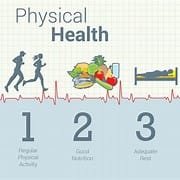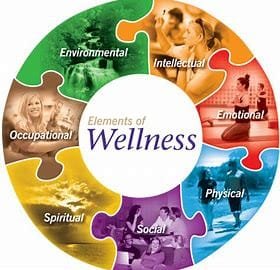Physical wellness is not just the absence of disease but an active function that sustains a healthy body by maintaining a balanced lifestyle. In today’s fast life, it is easy to neglect physical health due to work pressure or a busy schedule, but maintaining physical wellness is significant for mental and emotional health too. Let’s explore some of the major elements of physical wellness and how you can make it more productive in your daily life.
1. Concept of Physical Wellness

Physical wellness is the proper care of the body for many purposes. This includes adequate exercise, wholesome diets, proper sleep, and effective stress management. When you achieve physical wellness, then all systems of your body are in harmonious equilibrium to enhance your standard of living. That is not merely not suffering from disease; it is enhancing your status to enhance more well-being.
2. Role of Exercise
Exercise is the fundamental core of physical wellbeing. Exercise regularly, and you’ll have a well-conditioned cardiovascular system, stronger muscles, and improved flexibility. According to the Centers for Disease Control and Prevention, at least 150 minutes of moderate intensity or 75 minutes of vigorous exercise can be achieved on a one-week basis. Additionally, regular exercise shows benefits by retaining good moods, lowering risk for chronic diseases, and improving immunity.
An exercise routine you enjoy should be found in swimming, cycling, yoga, weightlifting, or whatever type of exercises work for you. Consistency is everything. Little bursts of physical activity every day can lead to great energy and better sleeping habits over time.
3. Nutrition: Fuel for the Body
An element as simple as good physical health calls for the balance consumption of nutritional foods through a well-balanced diet. Healthy nutrition provides the calories for our day-to-day activities while it provides nutrients to build and repair tissues, to strengthen our immune systems, and to maintain lucidity in our mental acuity. Some of the basics that should form the cornerstone of healthy balanced diets include fruits, vegetables, whole grains, lean proteins, and healthy fats.
A proper diet is made up of nutrients in unprocessed foods, avoiding high sugars and trans fats, while nutrient-dense foods need to be consumed to give the body the required vitamins and minerals. Proper hydration also plays a role—a lot of drinking water throughout the day will ensure that all functions in the body run smoothly and aid in detoxifying.
4. The Power of Sleep
Sleeping is grossly underappreciated, but it has the most significant impact on physical health. The sleeping process involves the repair of tissues and consolidation of memory while adjusting the hormones in the body. Poor sleep can lead to serious conditions like weakness in the immune system, uncontrolled weight gain, and mounting levels of stress. Most adults require at least seven to nine hours of sleeping every night.
Improvement of sleep habits should be done by setting up a standard sleeping routine, sleeping at the same time every day, and waking up early following the same daily routine. At the time of sleeping, ensure you remove any stimulative screens and stress-inducing factors, and all should ensure you do not take caffeine or have a heavy meal before sleeping.

5. Stress management and physical health:
Chronic stress is too much damage to health, thus contributing to a myriad of problems, from heart and blood pressures to unhealthy digestion and even weakening the immune system of the individual. Mastering the technique about stress will thus form an essential aspect of physical well-being.
Reducing tension or stress through various methods such as meditation, deep breathing exercises, or hobbies also helps. Regular exercise, particularly yoga and mindfulness, can also become very effective techniques for reducing stress. Having more time for relaxation or downtime is as essential as balancing the energy of the physical and mental worlds.
6. Abstinence from harmful substances
Another essential aspect of physical fitness is the prevention of toxic substances in the body. This comprises smoking and other drug and substance abuses with dire long-term effects on your general physical health, such as cancers, liver disease, respiratory conditions, and many chronic diseases. Stopping smoking and reducing alcohol consumption can have significant short-term gains for your overall well-being.
7. Preventive Healthcare
This includes regular medical checkups and screenings that may identify some potential health issues in advance and treat them early. Preventive healthcare encompasses routine vaccinations, blood pressure monitoring, cholesterol checks, and cancer screenings. It can prevent minor issues from turning into serious health problems. Most importantly, the guidance of doctors about diet and exercise and in general about one’s well-being stands as the crux for maintaining one’s physical health.
8. The Mind-Body Connection
Physical health is, in fact, interrelated with mental and emotional well-being. Exercise, a healthy diet, and rest help either enhance or fight mental health disorders like anxiety and depression. On the other hand, mental health influences physical well-being. A long period of stress or depression can drain one’s energy, making it difficult for an individual to maintain healthy habits.
Improve Your Mental and Physical Health with Practices Like Mindfulness and Meditation Cultivate stress reduction, improve focus, and enhance emotional regulation. Lay a balanced and fulfilling life through the cultivation of a strong mind-body connection with yoga, Tai chi, or similar practices.
9. Conclusion: Building a Foundation for Physical Wellness

Physical wellness is a journey taken throughout life, requiring persistent effort to achieve its best fruits. Improve exercise, nutrition, sleep, manage stress, and preventive care toward improved physical health and mental and emotional well-being.
For those who want to build healthy habits, it must be done in small, manageable steps. Whether it is exercising regularly, eating healthier meals, or even getting better sleep, every good change means overall wellness. Taking care of your body improves the quality of life in every facet and makes you genuinely thrive in all domains.
Pursuing these principles makes for a strong foundation in the daily pursuit of a vibrant and healthy life.



